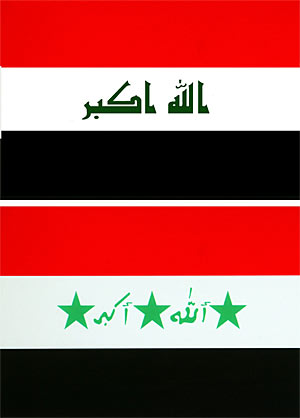
January 23, 2008 | By Kimi Yoshino | Los Angeles Times Staff Writer
BAGHDAD -- Iraqi lawmakers approved a new flag Tuesday, defusing a long-simmering dispute with the country's northern Kurds, who had refused to fly the national banner because of its connection to Saddam Hussein.

The temporary flag, a one-year stopgap until a more permanent design is selected, will no longer bear the three green stars representing the "unity, freedom, socialism" motto of Hussein's Baath Party. The former leader's handwritten "Allahu akbar" (God is great) will be replaced with an old-style Arabic font.
Kurds have long flown their own flag, a sun-splashed banner with bands of red, white and green. But the division between them and Iraq's Arabs escalated in September 2006 when Kurdistan regional President Massoud Barzani banned the national flag from being flown atop official buildings.
He had also said he would not raise the Iraqi flag in March for a pan-Arab meeting of politicians scheduled to be held in Iraqi Kurdistan.
But after 110 of the 165 lawmakers present approved the changes, Kurdish officials said the regional government would accept the new flag.
"We are glad for the change that was implemented to the old flag," said Fuad Hussein, Barzani's chief of staff. "We will raise this flag side by side the Kurdistan regional flag."
Parliament rejected three other options, which included changing the meaning of the stars to "freedom, justice and forgiveness," changing the color of the phrase "God is great" to yellow from green, or changing it to yellow outlined in blue. The addition of yellow would have been an acknowledgment of the sun on Kurdistan's flag.
Though lawmakers were able to strike a deal, they remain deeply divided on how to unite the central government in Baghdad and the semiautonomous Kurdistan regional government.
The Kurdish region in northern Iraq also has its own language and national anthem. It proclaims itself "the other Iraq," and Kurds consider themselves vastly different from their Arab neighbors.
The two factions continue to spar over the budget, the future of oil-rich Kirkuk and oil contracts Kurdistan officials have signed with foreign businesses despite the objections of the federal government.
"It's a gesture of good intentions and, honestly, it's a positive development," acknowledged Adil Barwari, a Kurdish member of parliament. "When the dictator has changed, the flag has to change."
Still, he said he was troubled by continued efforts to cut Kurdistan's proposed 17% share of the national budget. If the amount is reduced, Barwari said, he will vote against the spending plan.
Other parliament members who opposed the new flag said the changes might cause further problems.
"We feel that this matter is going to divide the Iraqis again," said Saleh Mutlak of the National Dialogue Council, a Sunni Arab slate that includes former Baathists. "It will reduce the stability of the country and increase the violence. It will separate the Iraqis more than they are now from the government."
He said the government should tackle more pressing issues, including the country's electricity crisis and problems with water treatment.
"They are not caring about the suffering of people, but they do care to take revenge for the past," Mutlak said.
Throughout the country too, Iraqis remained divided.
"This is literally a comedy," said Haseeb Mohammed, 33, a Sunni Arab in Mosul. "Is this Iraq's flag? What was wrong with it? What has changed? Nothing has changed. It's just a poor comedy charade to satisfy some sides. It's a conspiracy against Iraq and the Iraqi people."
But in the northern city of Kirkuk, residents were praising the move. "Thousands of people were killed and whole villages were annihilated by the fascist Baath regime and under the old flag," said Rizgar Khorsheed, a 55-year-old Kurd. "This change signifies that Iraq is treading toward democracy and the establishment of a federal country founded on justice and equality."
With the flag issue temporarily resolved, parliament might now address more important matters, said Waheed Khalil, a Shiite Muslim in Mosul.
"There are many problems that the Iraqi people are suffering from that the representatives should have taken care of," Khalil said. Now, he said, "I hope that our officials will look after the Iraqi people's needs and priorities."
Meanwhile, a suicide bomber pushing a small cart carrying an old water heater blew himself up in front of a high school in Baqubah, capital of troubled Diyala province. The blast killed one other person and injured 21 more, most of them teachers and students, police said.
Just south of Baqubah, police discovered seven dead family members. A joint patrol of the Iraqi army and police discovered the bodies of a father, his five sons and a cousin. All had been killed execution-style, with their bodies showing signs of torture, police said.
In Anbar province, police thwarted a female suicide bomber after receiving a tip that she might attack a checkpoint northeast of Fallouja.


